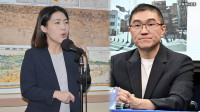《TAIPEI TIMES 焦點》 Lawmaker urges review of curriculum adjustment
CORRECTIVE LESSONS: Legislator Chen Ting-fei called for a committee to be formed to deal with unilateral and uninformed policymaking by the Ministry of Education
By Lin Hsiao-yun and Chen Wei-han / Staff reporter, with staff writer
Following the furor caused by the Ministry of Education’s adjustments to school curricula, a lawmaker yesterday proposed the establishment of an independent state curricular review committee.
The proposed agency would prevent political meddling and incorporate the views of civil education groups in the review process, Democratic Progressive Party (DPP) Legislator Chen Ting-fei (陳亭妃) said yesterday.
A transparent, bottom-up process should replace the ministry’s current method of unilaterally drawing up the curricula, and extensive surveys of potential educational value should be conducted prior to any adjustment, she said, adding that the proposal would allow civil education groups to put forward curricula to the committee for review.
Chen said she would draft an amendment to the Educational Fundamental Act (教育基本法) that would be aimed at overhauling the existing system.
The current procedure for drafting curricula requires the National Academy for Educational Research to propose a draft curriculum for the academy’s Committee of Curriculum Development to review, before the draft is sent to the ministry’s curricular review committee for final approval.
It is up to the ministry and the academy to use their discretion in selecting members of the committees.
K-12 Education Administration Director Wu Ching-shan (吳清山) objected to Chen’s proposal, saying that there would be many overlaps between Chen’s proposed committee and the academy’s committee.
In response, Chen said that the ministry had been able to put forward the controversial curricular adjustments because the academy is a subordinate to the ministry, while her proposed committee would be independent of ministry influence.
Examples of the contentious changes to the history curriculum included revising the term “Japanese-governed period” to “Japanese occupation period,” and naming the period during which Koxinga, also known as Cheng Cheng-kung (鄭成功) — who ruled Taiwan in the 17th century — the “Ming-Cheng period,” with “Ming” signifying China’s Ming Dynasty, despite the Ming not, in official terms, claiming sovereignty over Taiwan, education groups said.
Jendo Education Society leader Ding Gih-jen (丁志仁) said that a central, independent organization responsible for curricular development should have been instituted long ago, adding that such an organization should adopt collaborative decisionmaking in contrast to the ministry’s arbitrary policymaking, adding that the committee must not be affiliated with any political party and should have a balance of male and female members.
A new committee could address the ministry’s unilateral and uninformed policymaking, Taichung Bureau of Education Director-General Yan Ching-hsiang (顏慶祥) said, adding that such a committee should be solely responsible for drafting and reviewing curricular guidelines, while leaving the textbook review to the academy to avoid a conflict of interests.
National Alliance of Parents chairman Hsieh Kuo-ching (謝國清) said that the proposed committee should wield more authority than the ministry so it could avoid administrative manipulation.
Action Coalition of Civics Teachers convener Chou Wei-tung (周威同) said that the proposed committee should be treated equally to the Academia Sinica in terms of hierarchy, organization and funding, while it should take grassroots teachers’ opinions into consideration.
新聞來源:TAIPEI TIMES












